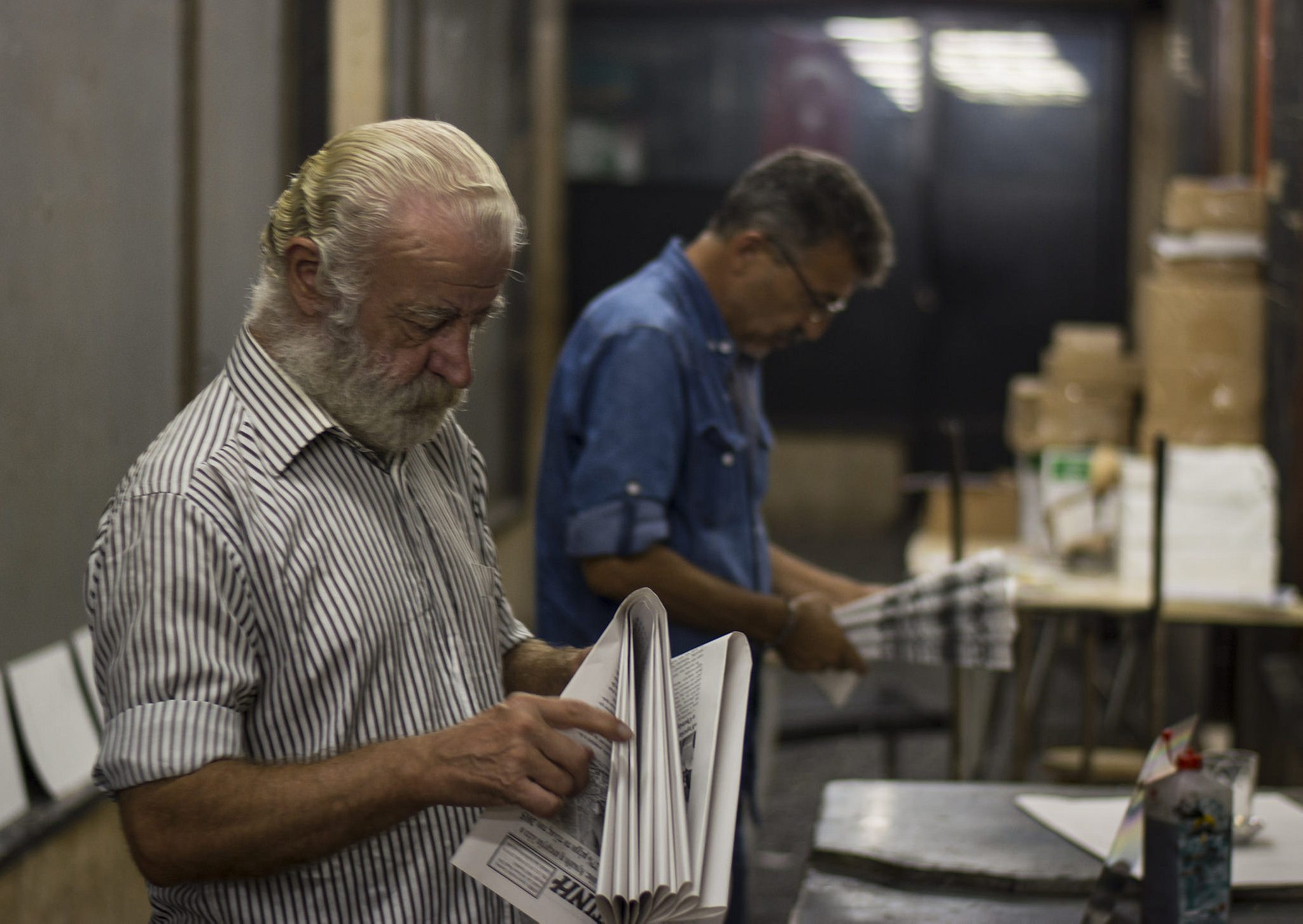In Istanbul, a once-mighty newspaper that serves the country’s dwindling Greek community is in danger of collapse
ISTANBUL, Turkey–
In the grotty basement offices of a small publishing house in central Istanbul, five shaggy men stack and fold a four-page daily newspaper while a sixth man, wearing an undershirt and shorts, runs a small noisy printing press. The men, all Turkish, cannot read a word of the paper because it’s in Greek. Soon they will hand deliver all 600 copies of Apoyevmatini (which translates to “afternoon”), almost one for every remaining Greek family in Turkey.
Three of the men have been delivering the paper for 30, 50, and 60 years, respectively. Sebahattin Esen, 56 and unshaven with a warm smile, says he feels like he’s a part of the Greek community. “I regularly come inside, have a coffee with them and chat,” he says.
At this time of year many of Istanbul’s mostly elderly Greek residents stay in summer homes on the nearby Princes’ Islands, where cars are not allowed. “Distributing the newspaper on the islands is really hard because of the hills,” Esen says. “You need to use a horse-drawn carriage. And this is all for a newspaper that costs 50 Kurus [25 cents]. But because of our services, readers duly value us; we don’t take money for the newspaper. We take whatever they feel like giving.”
Turkey’s once-significant Greek population now sits on the verge of extinction, thanks to repressive state policies that forced or compelled them to leave the country during the twentieth century. Lacking a large readership to support it, Apoyevmatini is also in danger of folding.
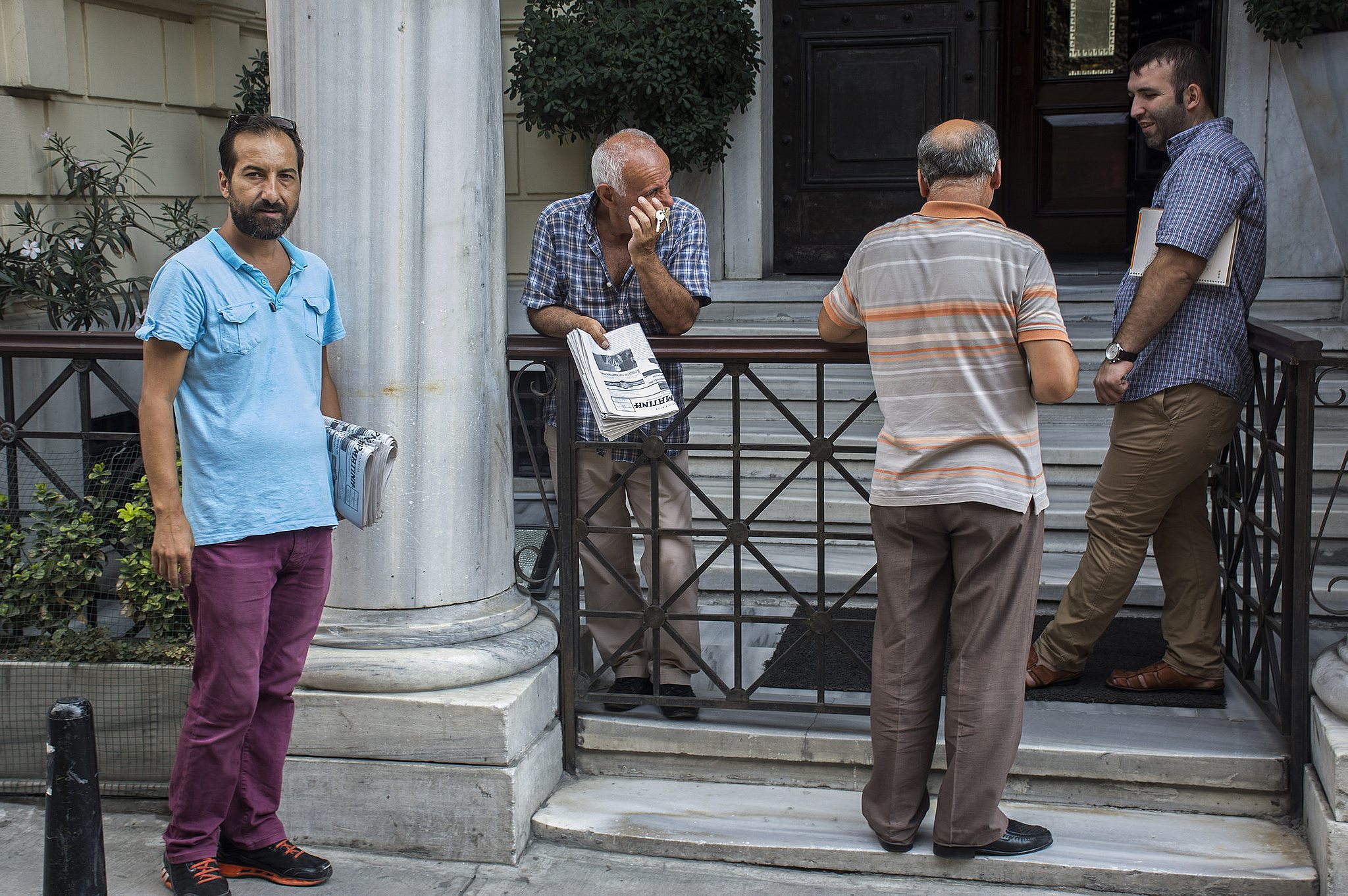
It’s 11:00 a.m. and time to deliver. I tag along with Mustafa Yorukcayir as he walks his winding route through Cihangir, a historically Greek neighborhood that is now the dominion of expats, artists, and intellectuals. We walk past the enormous marble pillars of the 120 year-old Zografeion Lyceum for boys, one of the last Greek schools in Turkey. Yorukcayir hands papers to a couple of stern-looking, grey-haired men, among the last representatives of a vanishing people. Nowadays they mostly read the paper to check the obituaries, Yorukcayir tells me.
An elderly woman peeks her head out of a second story window and lowers a wicker basket down to Yorukcayir, who loads it with her paper. The route ends at the massive dome and soaring steeples of the 134 year-old Hagia Triada Greek Orthodox Church, overlooking Taksim Square. Black scars on the surrounding buildings have been left there intentionally as a reminder of a 1955 government-orchestrated pogrom during which Turkish nationalists tried to burn the church down.
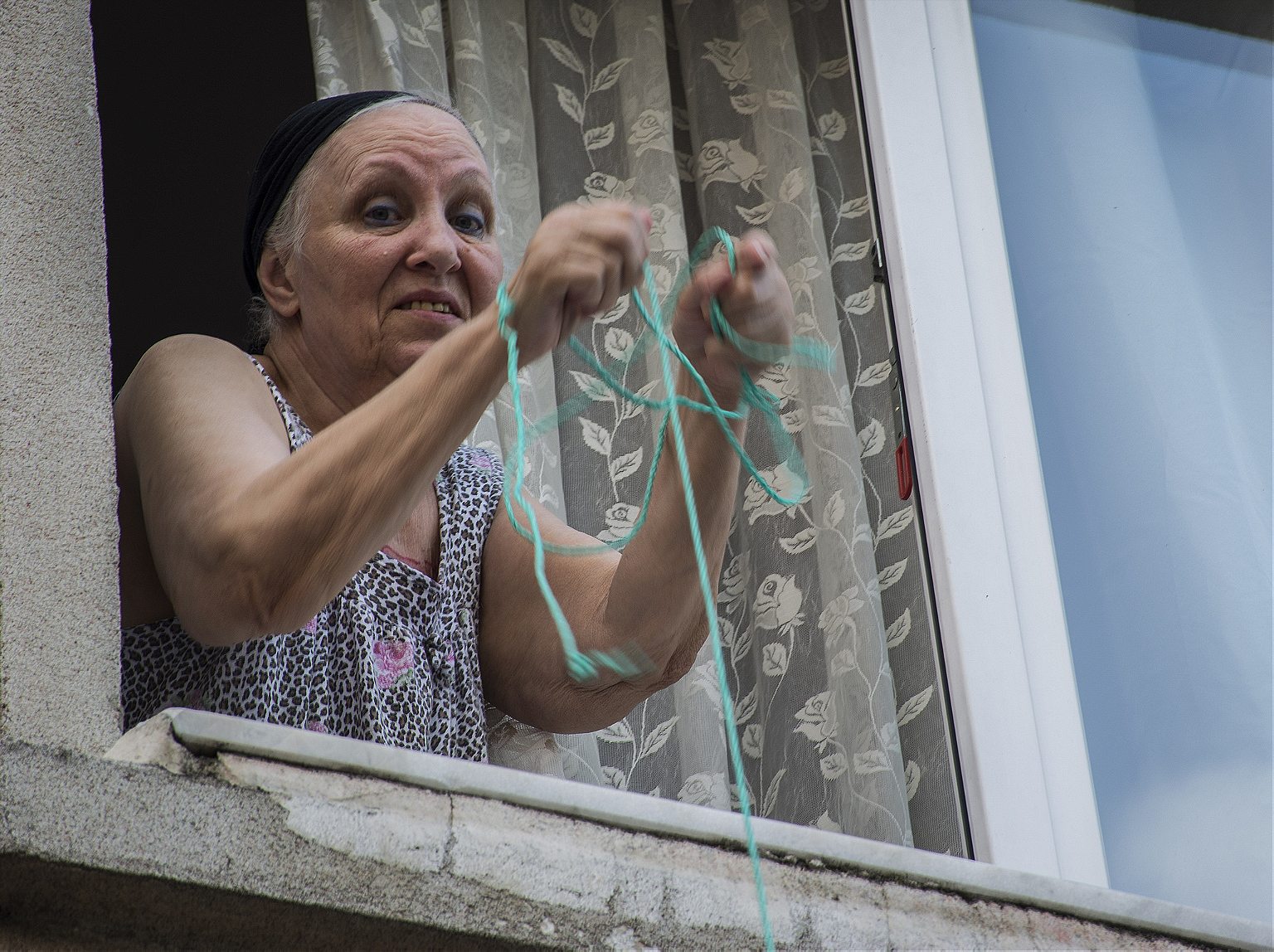
I meet with Apoyevmatini’s editor, 75 year-old Mihail Vasiliadis, in his apartment in Istanbul’s Kurtulus neighbourhood, formerly known as Little Athens. The jocular newsman has a short, grey ponytail and a mischievous twinkle in his eye. We’re sitting in his small living room, the walls adorned with old pictures of Istanbul.
Vasiliadis tells me the paper and Turkey’s Greeks, referred to as “Rums,” are one and the same. “There’s one woman [who’s since passed away] who gave her key to one of the delivery people. If she’s not home, he opens her door, puts the newspaper inside, and closes the door again. That’s how tight the bond is between Apoyevmatini and the Rum community.”
He jokes that the paper should be in the Guinness Book of World Records for having a readership rate of nearly 100 percent of its target population. However, a circulation of 600 is a far cry from the over 30,000 copies Apoyevmatini sold in its early years in the 1920s and 30s. Turkey’s second-oldest daily employed 20 people, had its own printing press in its office in central Istanbul, and was the country’s most widely read paper in its heyday.
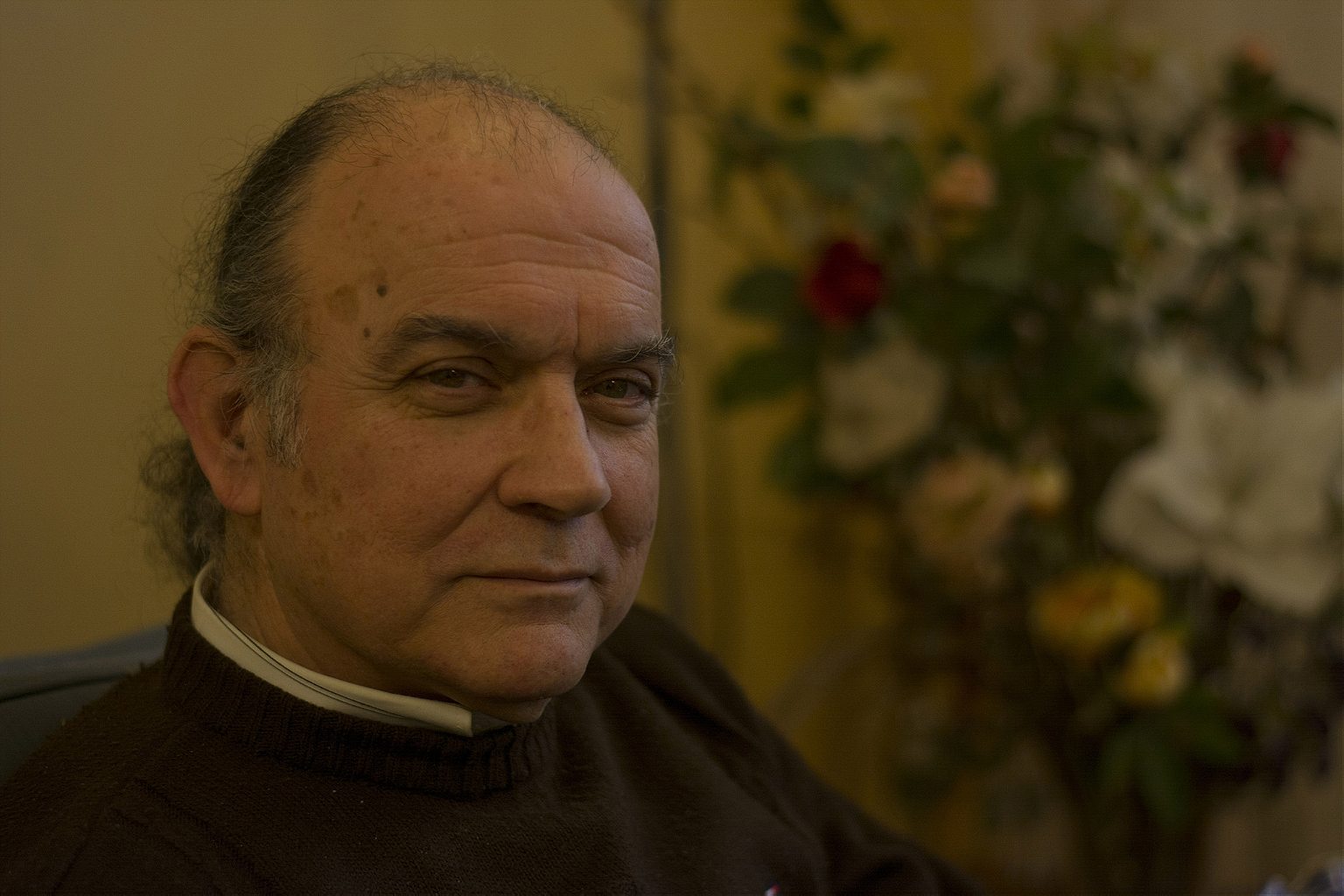
Today it limps along out of Vasiliadis’s home, financed by his retirement fund and a trickle of cash from subscription fees, donations, obituary notices, and church bulletins. It’s losing money. As he leans back in his armchair, he begins to tell me the tale of the paper’s fall, which is the story of the Greek Turkish community’s own slow death.
Turkey’s Greeks, became known as Rums, meaning ‘Roman’ during the Byzantine Empire. They have a history in Anatolia—or Asia Minor—going back over 3,000 years. Homer, Herodotus, King Midas, and Saint Nicholas were all originally from these lands.
The city of Byzantium, later known as Constantinople and then Istanbul, was itself founded by Greek colonists in 667 BC. By the fourth century AD, Anatolia was overwhelmingly Greek-speaking and Christian, and for the next 600 years, the region was the centre of the Hellenic world.
After the Ottoman conquest of Constantinople in 1453, Greeks enjoyed a prominent status in the cosmopolitan Empire, exercising religious freedom and working as wealthy merchants, senators, and even ambassadors. They had an autonomous legal system with their own judges, laws and prisons. By the turn of the twentieth century, almost three million Greeks lived in the Ottoman Empire—over ten percent of the population.
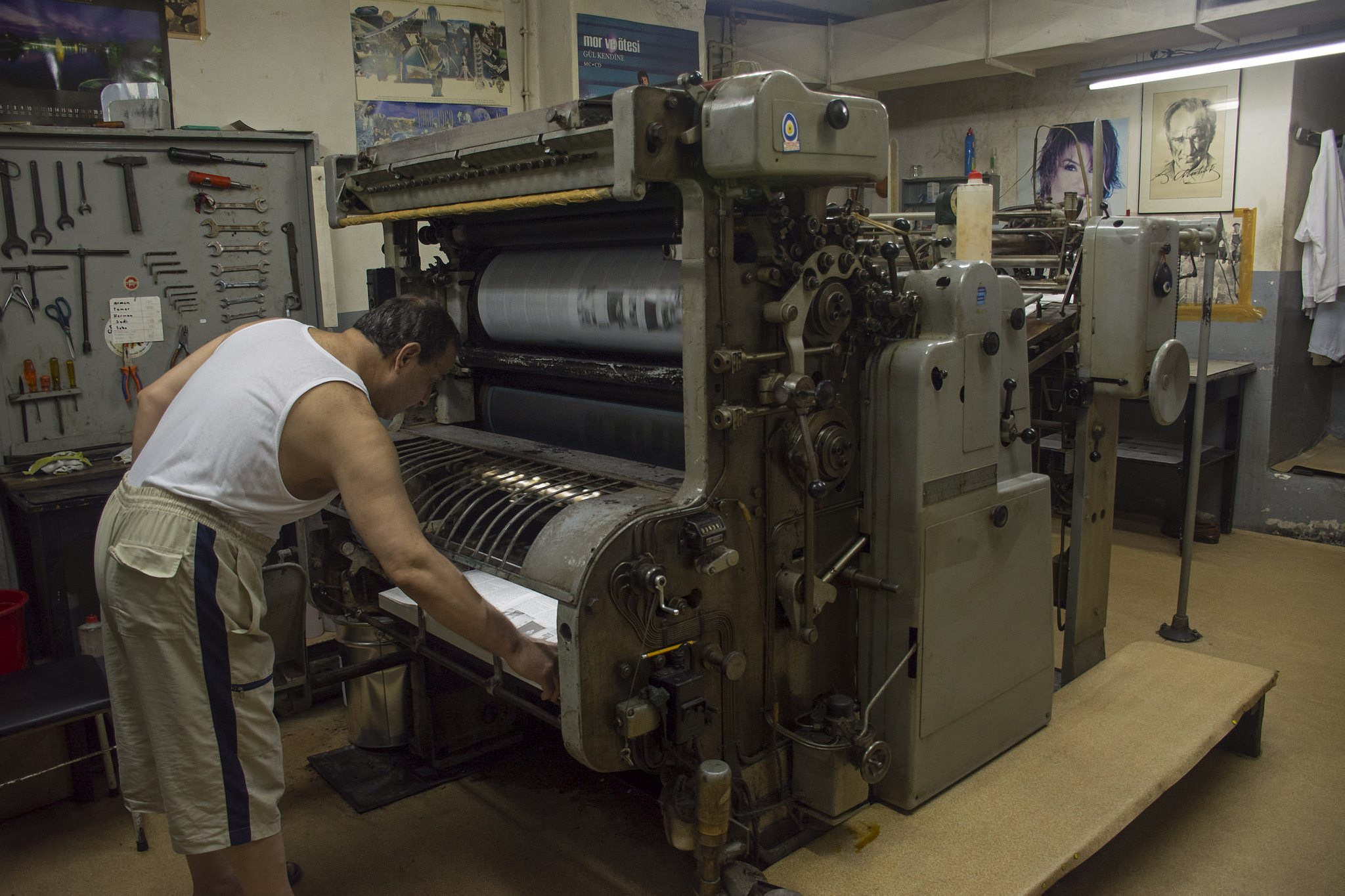
During World War I, which the Ottoman Empire and Greece fought on opposite sides, hundreds of thousands of Ottoman Greeks died from repressive state policies such as death marches. After the war, 20,000 Greek troops occupied the Ottoman city of Izmir. During the ensuing Turkish War of Independence, Turkish nationalists drove out the Allied victors who had invaded the empire and attempted to carve large parts of it up. Many civilians were slaughtered by both sides during the conflict, with Greeks bearing the brunt of it. The 1923 Lausanne Treaty, which finally ended armed conflict between Turkey and the Allied Powers, saw the forced deportation of all Turkish Greeks not living in Istanbul, leaving only 200,000 in the city.
The new Turkish republic that emerged from the ashes of the Ottoman Empire adopted a policy of strict assimilation in an effort to bind the country together. The state tried to appeal to non-Turkish Muslims using religion, but faith couldn’t be used to integrate non-Muslims.
“Because of that, non-Muslim minorities were not subjected to an assimilation program, but one of withering away, through policies such as forced migration,” Vasiliadis says. “The state got rid of them.”
A crippling wealth tax targeting non-Muslims caused thousands of Greeks to flee
Draconian policies like the Citizen Speak Turkish campaign of the 1930s discouraging people to speak minority languages in public and a crippling wealth tax targeting non-Muslims in the 1940s caused thousands of frustrated, heartbroken Greeks to flee. Widespread, newspaper-spurred xenophobia culminated in a bloody, government-organized pogrom in Istanbul on September 6-7, 1955. Rioters killed over a dozen people, raped women, desecrated churches, and completely covered Istanbul’s pedestrian thoroughfare Istiklal Avenue with clothing, glass, and burning cars.
Vasiliadis was just a boy when it happened, working in a furniture shop before the start of the school year. “The houses and workplaces of Rums, Armenians, and Jews had all been marked days ahead of time,” he says. “There were things broken everywhere on the street. I went home using the backstreets. When I got home, our doorkeeper, Mr. Ahmet, was waiting at the door. He stood in front of the house, and when the mob came, he said, ‘There are no infidels here, everyone is a Muslim,’” preventing an attack. When they left, he opened the door, put the flag there, took a pickaxe and stick, and set off after the mob to destroy Rum homes. He first saw to his duty of friendship before seeing to his duty to the nation.” After that, many Greeks fled to Greece, a mostly foreign country for them. Today, only about 2,000 Greeks remain.
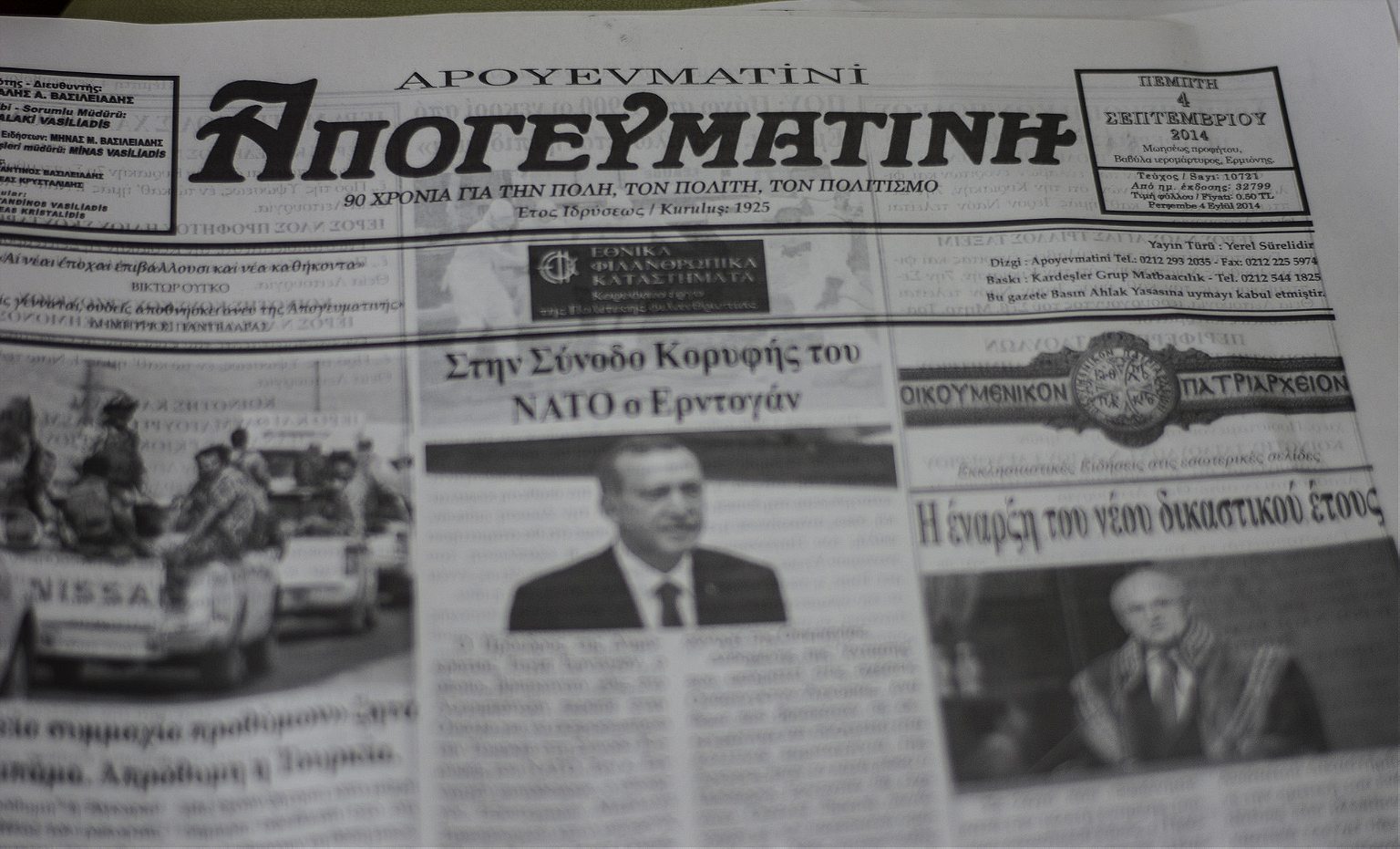
Apoyevmatini’s motto is “No one is born or dies without Apoyevmatini’s knowledge,” but there aren’t a whole lot of Rums being born anymore. Their average age is 65, and only about 250 Greek students remain in just three main schools. The paper publishes national and global news, events and postings relevant to the Rum community.
When Vasiliadis, a journalist with decades of experience at papers in Istanbul and Athens, took over Apoyevmatini in 2002, it was on its last breaths, selling only 80 copies. Though he managed to get virtually all the Rums reading the paper, the community was simply too small to finance it. In 2011 he announced he would be closing the then 85 year-old paper.
“I remember I couldn’t even finish my sentence,” Vasiliadis says. The announcement caused a small uproar amongst Istanbul’s literati, concerned with losing such a valuable cultural artefact. “One professor said to me, ‘You have the right to run this newspaper alone, but you don’t have the right to close it alone.’”
Efe Kerem, a Turkish PhD candidate at VU University in Amsterdam, heard the announcement and helped organize a campaign to save the paper. He says he felt a sense of shame and guilt for the historical mistreatment of the Rums. “I’m a Turkish citizen, so I feel responsible for whatever this country has done,” he said during a Skype interview.
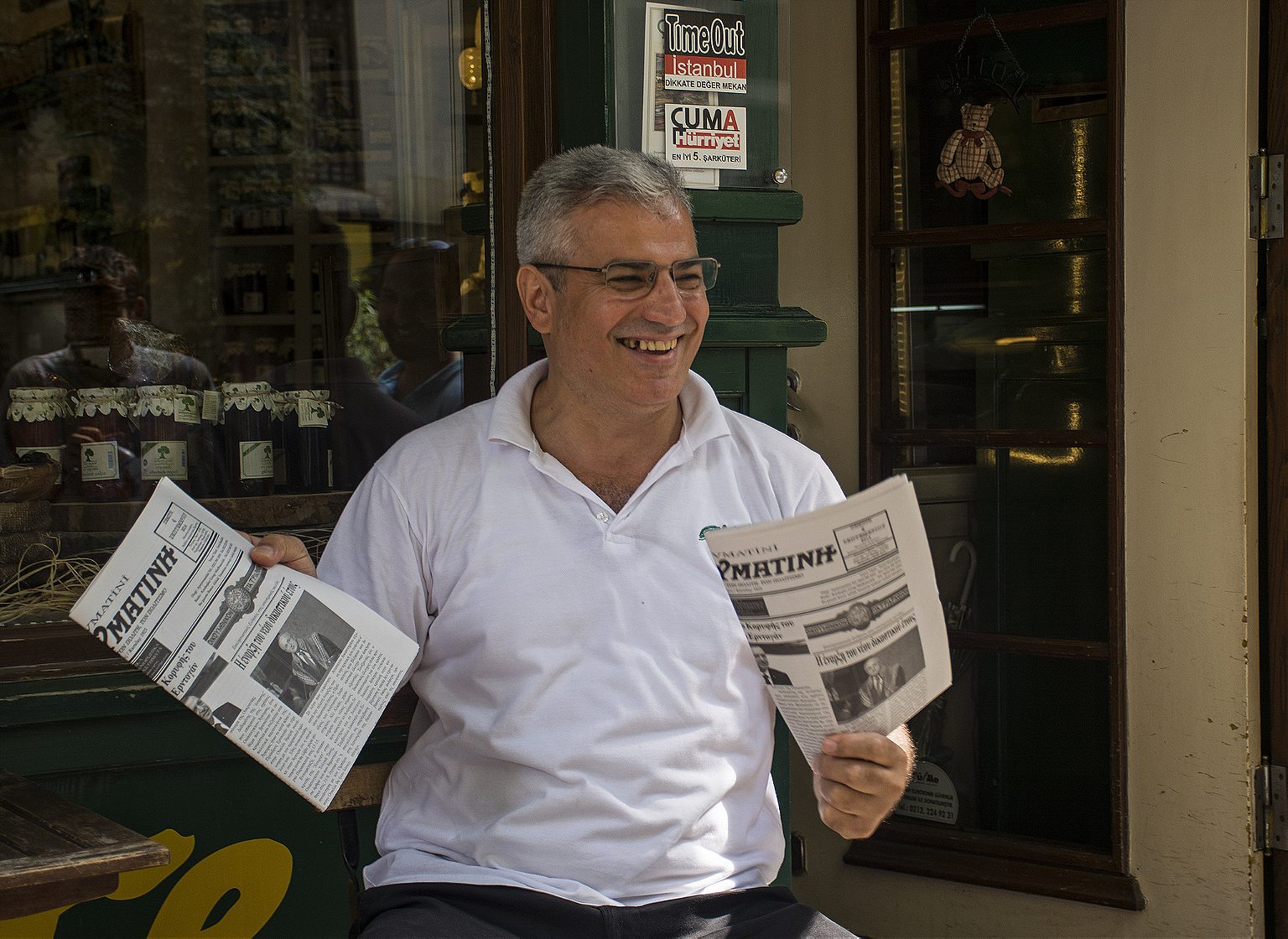
So Kerem spread the word about Apoyevmatini’s situation to his friends and peers, including media scholars, and soon an online campaign was launched. Hundreds of Turks subscribed to the Greek-language paper, despite not being able to read it, allowing it to stay open a little longer.
Vasiliadis is grateful for the support, but he says it’s unsustainable. He isn’t sure how much longer he can go on. He feels guilty asking Turks who don’t even understand Greek to subscribe to the 88 year-old paper. Vasiliadis has hope for the future, but worries that his faith may be in vain, conjuring a metaphor of a man falling from the 88th floor of a skyscraper. “When he falls past the ground floor, he thinks to himself, ‘Things have been good up until now, let’s see what happens next.’ That’s the kind of optimism he had,” he ponders with a sad smile.
Many say the government has a responsibility to the paper and the ancient minority it serves
Because the demographic crisis that’s slowly killing Apoyevmatini was caused by the state, many say the government has a responsibility to the paper and the ancient minority it serves. “They should now reverse this somehow, and help us out,” Vasiliadis’ son Minas, the paper’s only other employee, tells me.
I meet him in Apoyevmatini’s tiny office, a fraction of its former size and recently shut down because they can no longer pay the rent. It’s become sort of a living museum of the paper’s golden age. Sitting on a shelf is an old radio on which reporters used to listen to newscasts from around the world, while furiously scribbling notes. On the wall hangs a framed copy of the paper’s first issue, its name written in both Greek and the old Ottoman arabesque script, dated July 12, 1925. Written on the letterhead is one of the paper’s mottos, a quote from Victor Hugo: “New epochs bring new missions.”
Minas, 31, handsome with ear-length sable hair, is sitting in a dilapidated swivel chair, making his case for Apoyevmatini. “First of all, it’s like a lighthouse,” he says, explaining that the paper not only reports the news, but keeps the tiny Greek community connected and serves as their collective voice. “If the newspaper was gone, it would be harder to have a dialogue within the community.”
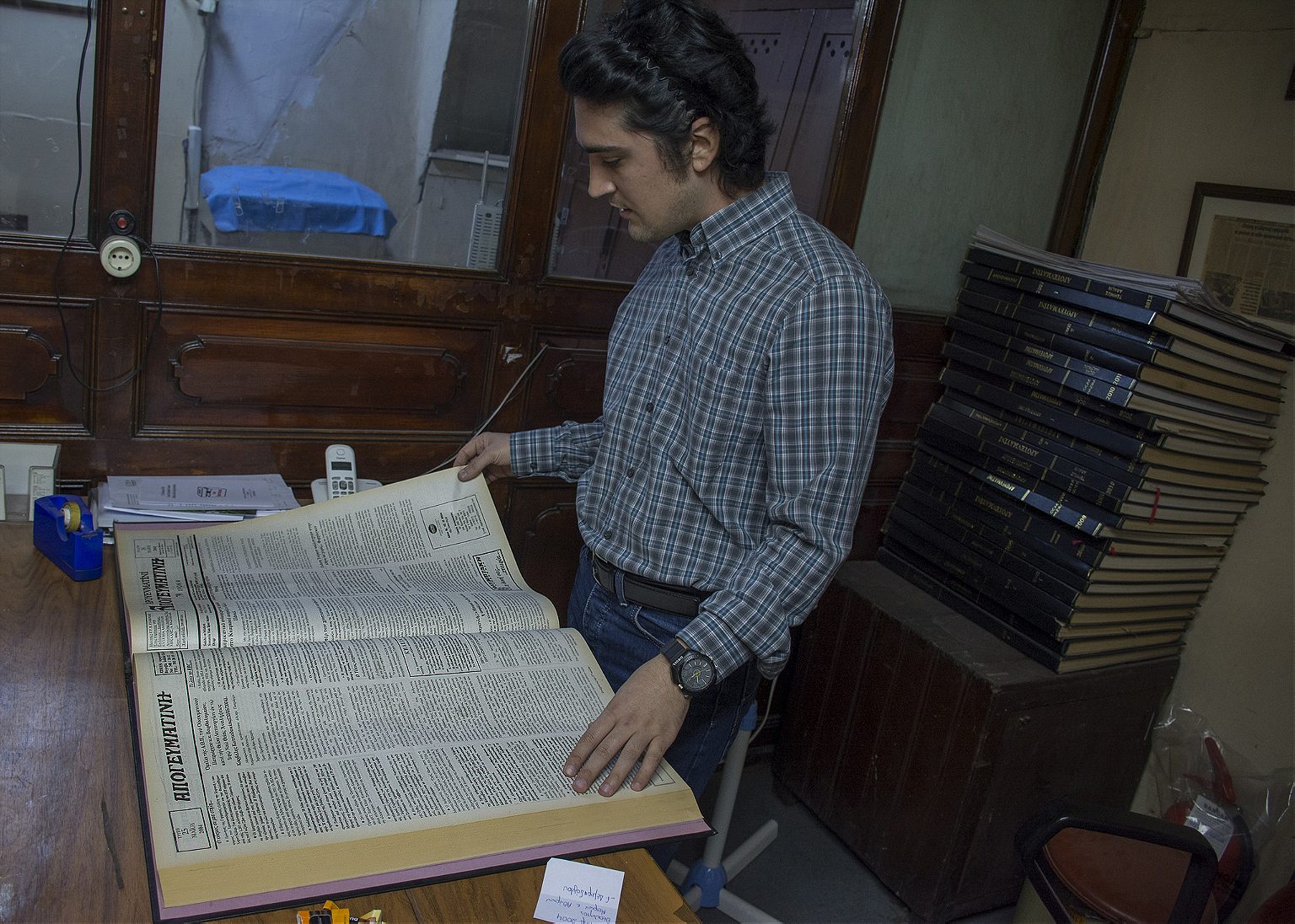
Since the paper’s near-shutdown in 2011, the government has been helping with small, irregular donations. In recently gave the equivalent of almost $13,000, but that only covers about 10 percent of costs. However, Minas isn’t only asking for support for Apoyevmatini. There’s little point in saving the paper if there’s no one left to read it. The root of the problem is the shrinking and aging Rum population, and that’s what needs to be addressed, he says. The community can only be saved by integrating immigrants from Greece. “We need an immediate blood transfusion,” he explains. “We need new people, ideally from Greece, who speak the language perfectly.” These days most Rum children don’t even speak fluent Greek.
Thanks to Greece’s economic troubles, young Greeks are starting to cross the Aegean Sea in search of jobs. There are approximately 1,000 in Turkey, but most turn back in defeat, thwarted by Turkish bureaucracy. “We need the government to lift some barriers, and even use some positive discrimination measures, taking into account that we’ve suffered from racist policies in the past,” Minas says. For example, giving immigrants from Greece resident and work permits without the same stringent rules that apply to others, and ending the property ban for Greeks in Istanbul and many other places. “These people will be forever tourists, unless they get legal help from the government.”
Minas is quick to point out that Turkey’s ruling AKP has made many concessions to the Rums, such as returning property seized by the state in the past and passing laws empowering local Rum foundations. “The AKP is the only party that’s made overtures to the Greek minority. Maybe it’s not enough, but this is the one party that allowed us to do things that 10 years ago would sound like a joke.”
Turkish Prime Minister Ahmet Davutoglu, when he was foreign minister, publicly invited Rums exiled from the Princes’ Islands to regain their citizenship and return to Turkey in 2013, but concrete policies have yet to emerge.
One day Minas will take over the paper from his father, but he fears he won’t have any help. “I don’t see that I have any other choice. I don’t want to let this paper go. I will continue and become the editor if necessary, but it will be funny, because it will be only me.
